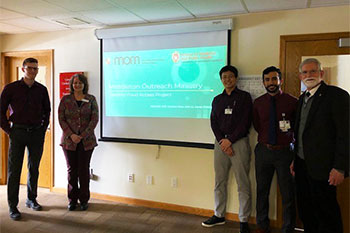Short shelf life and expense are the primary barriers to eating healthy foods based on findings from a community partner driven project focused on access to and consumption of healthy foods in neighbors experiencing food insecurity.

Students presented their data on February 13. From left: Medical student Arron Rottier; Shirley Nennig, former distribution manager for MOM; medical student John Li; medical student Abdullah Adil; and David Deci, director of medical student education.
Under the guidance of UW DFMCH Director of Medical Student Education David Deci, MD, a team of SMPH medical students partnered with the Middleton Outreach Ministry (MOM), a non-profit that hosts one of the largest food pantries in Dane County, to address healthy food access in the communities of Cross Plains, Middleton, and West Madison.
Developing Questionnaires
The team designed two questionnaires: the Food Access Survey addressed access to the MOM pantry, access to healthy food in the community overall and demographics; and the Healthy Food Assessment focused on individual consumption of healthy foods, perceptions, barriers to healthy eating, and pantry stock. The results showed that providing access to a wider variety of foods with longer expiration dates may help neighbors struggling to meet nutritional guidelines. “Access to nutritious food is one of the pillars of the Social Determinants of Health. We’re grateful for the support of the UW Department of Family Medicine and Community Health and for the steadfast work of the students in helping us provide even better services to our community. Collaborative partnerships are vital to creating research driven programs and approaches,” said MOM Executive Director Ellen Carlson.
Education Through Community Engagement
The project started in January 2018 with the support of MOM, Dr. Deci, and UW DFMCH faculty and staff including Bethany Howlett, MD; Mark Beamsley, MD, MS; and Christie Legler. Three to four different students were assigned to the project every 12 weeks as part of their Chronic and Preventive Care (CPC) rotation. “MOM has been an incredible educational partner,” said Dr. Deci.
The collaboration with MOM is just one of many community health engagement projects (CHEP) available to students. Other opportunities include partnerships with the Goodman Community Center, Boys and Girls Club of Dane County, The Rainbow Project, Wisconsin Literacy, and Wisconsin Voices for Recovery.
Published: March 2020
